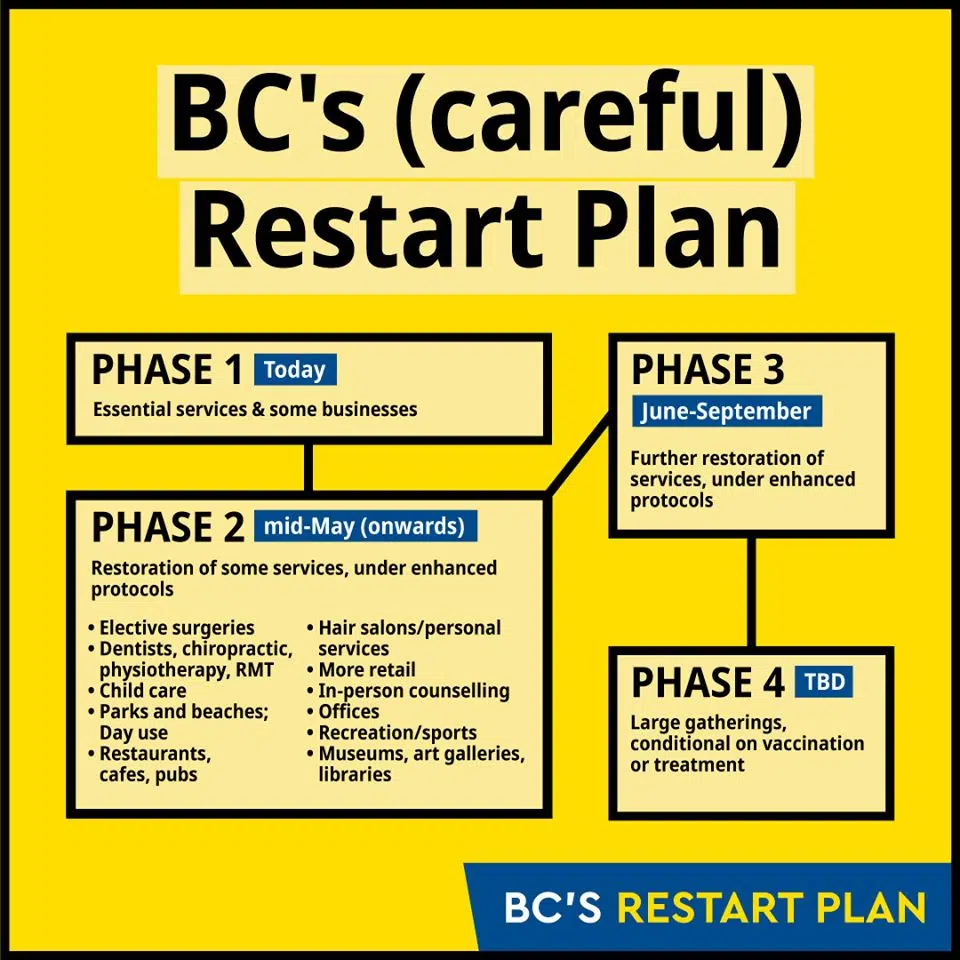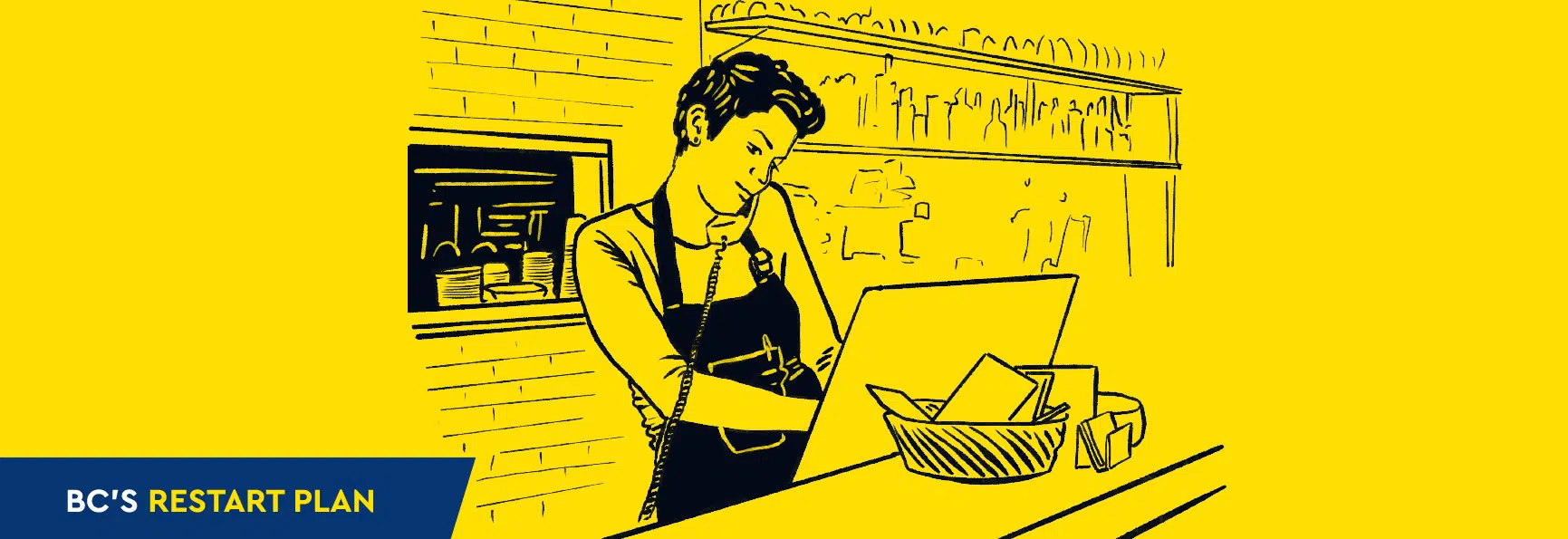BC’s Restart Plan
Premier John Horgan released details Wednesday about B.C.’s plan for the reopening of services amid the COVID-19 pandemic.
Here are the things to know about the timeline, testing strategies, and public health protocols for businesses, schools, daycares, retailers, and sports.
 Phase 1
Phase 1
Where we are today
Essential Services Operating During COVID-19
Essential health and health services
Law enforcement, public safety, first responders and emergency response personnel
Vulnerable population service providers
Critical infrastructure
Food and agriculture service providers
Transportation
Industry and manufacturing
Sanitation
Communications and information technology
Financial institutions
Other non-health essential service providers
Industries that were designated as essential services developed safe operation plans in consultation with WorkSafeBC and in compliance with the public health orders issued by the Provincial Health Officer.
As a result, B.C.’s economy has continued to operate in ways other provinces haven’t. But it’s undeniable that local businesses have suffered.
Many businesses closed for other reasons, including reduced demand, such as in the retail, hospitality and export industries. Others closed to do their part in helping to flatten the curve, protecting their customers and employees.
To help these businesses and other organizations get back on their feet, we need workplace practices that ensure British Columbians feel safe, whether they are returning to work or going out as a customer. That means employers will need to engage with their employees to find the right solutions and consider the concerns and needs of their customers.
Phase 2
Mid-May onwards
Under enhanced protocols:
Restoration of health services
Re-scheduling elective surgery
Medically related services:
Dentistry, physiotherapy, registered massage therapy, and chiropractors
Physical therapy, speech therapy, and similar services
Retail sector
Hair salons, barbers, and other personal service establishments
In-person counselling
Restaurants, cafes, and pubs (with sufficient distancing measures)
Museums, art galleries, and libraries
Office-based worksites
Recreation and sports
Parks, beaches, and outdoor spaces
Child care
Phase 3
June to September
If transmission rates remain low or in decline, under enhanced protocols:
Hotels and Resorts (June 2020)
Parks – broader reopening, including some overnight camping (June 2020)
Film industry – beginning with domestic productions (June/July 2020)
Select entertainment – movies and symphony, but not large concerts (July 2020)
Post-secondary education – with mix of online and in-class (September 2020)
K-12 education – with only a partial return this school year (September 2020)
Phase 4
To be determined
Conditional on at least one of the following; wide vaccination, “community” immunity, broad successful treatments:
Activities requiring large gatherings, such as:
Conventions
Live audience professional sports
Concerts
International tourism
The timing of a safe restart of night clubs, casinos and bars is a more complicated consideration. As with other sectors, industry associations will be expected to develop safe operations plans, for review, that are in keeping with Public Health and Safety Guidelines, as well as WorkSafeBC.
Resources to assist businesses and sectors as they restart their activities including new Health Guidelines and Checklists are available from WorkSafeBC.
Some Next Steps to Make Life a Little Easier
Reopening our Parks
Reopening B.C.’s iconic parks will come in rapid stages. Our priority is providing safe access and services to people across the province while maintaining the safety of staff and park operators.
BC Parks and Recreation Sites and Trails BC will reintroduce services in keeping with direction from the Provincial Health Officer.
Parks Reopen
May 14, 2020
Beginning on May 14, 2020, those BC Parks, recreation sites and trails that can accommodate physical distancing will reopen for day use only.
This will include day-use sites and protected areas
Parks and recreation sites that can safely provide existing service levels, such as garbage disposal and washroom facilities, will do so.
These facilities will be cleaned more frequently
Some areas and facilities remain closed, including playgrounds, picnic shelters and visitor centres.
Check the BC Parks website for the most up to date information
Camping Resumes
June 1, 2020
Camping at provincial parks and recreation sites will reopen June 1, 2020, with some exceptions.
The BC Parks website will carry information about the status of camping in provincial parks
Reopening our Schools
As COVID-19 spread, governments everywhere took action to reduce in the classroom learning.
For most British Columbians with young children, this meant having to stay at home to look after their kids. While many workplaces have made work-from-home accommodations, that hasn’t been an option for everyone.
Our schools and educators rose to the challenge with online instruction and resources to keep our kids learning, but this placed a heavy burden on parents to support their kids as they learned at home.
We know there is no substitute for in-class instruction — and an important step toward our recovery is getting kids back into the classroom, so parents can get back into the workplace.
Initial health data indicates children are less affected than adults by the COVID-19 virus. Public health staff and officials will continue to review the health data. And the Ministry of Education and school divisions all around B.C. are reviewing options to allow for a safe return to school.
An announcement on a phased approach to resuming in-class instruction will be made in the coming weeks.
This will not be a return to normal. With weeks left in the school year, we anticipate many kids will not return to the classroom until September.
But we are also exploring ways to safely get some kids back to school before the summer, to allow more parents to return to work. How these changes unfold are the focus of intensive discussion among Ministry of Education officials, school trustees, the BC Teachers’ Federation, CUPE, and other education sector partners.
For more information on protective measures that will be required of schools and post-secondary institutions, please refer to the BC COVID-19 Go-Forward Management Strategy (PDF, 634KB).
Reopening Child Care & Summer Camps
Summer camps and child care services give our kids the chance to explore their interests and develop physically, mentally and emotionally. They also allow parents to continue to work knowing that their children are being well taken care of.
Like all businesses, child care centres and camps will need to take additional precautions to maintain the health and safety of their employees and the children they are caring for. For many child care centres that operated as essential services during the pandemic, they have already adapted and are operating safely. But reopening more child care centres will be a key part of getting more parents back to work.
The basics will include routine daily screening of staff and kids; frequent cleaning; and ensuring staff and children who have cold or flu symptoms do not attend child care or summer camps.
But these sectors will also be required to review and work through new practices in their specific sectoral standards such as the Child Care Setting Practice Standards.
For more information on protective measures that will be required of day cares and summer camps, please refer to the BC COVID-19 Go-Forward Management Strategy (PDF, 634KB).
Expanding Public Transit Services
Many of us know what it means to ride on a tightly packed bus or SkyTrain. Before the pandemic, physical distancing was not always an option.
British Columbians were quick to act on direction from the Provincial Health Officer, including staying home and avoiding unnecessary trips outside the home. This made riding public transit easier for people working in essential services.
As B.C. begins our restart and more people gradually return to the workplace, there will be greater pressures on our public transportation networks to help people get around safely.
Ensuring operators and passengers can safely use public transit is critical. Enhanced health and safety precautions, including frequent cleaning; wearing non-medical masks for riders and staff; use of plexiglass or physical barriers where possible for drivers; and staying home when sick will be a part of the new normal for the foreseeable future.
The safe operation of public transit is a priority for all British Columbians. Over the coming weeks, we will be working with our transit agencies on more detailed plans to gradually restore service levels as restrictions begin to lift – both to help people get around and to ensure people can continue to respect physical distancing.
How We’ll Keep Taking Care of Each Other
Supporting Families & Businesses
When the pandemic hit, the governments of British Columbia and Canada came together to identify critical supports for people, businesses and community organizations. The urgency of COVID-19 made it critical to plan, announce and deliver on vital supports for people and businesses across our province in record time.
These supports have helped people stay in their homes, support their families and make ends meet. But we know that the recovery will take longer for some British Columbians than others. Working with the government of Canada, local leaders and community organizations, we will be there to help them get through this.
Protecting Patients & Our Health Care System
Over the last three years, B.C. implemented an ambitious strategy to increase patient access to surgeries, expand priority programs and reduce wait times.
The strategy was working, providing 35,000 more people with access to critical surgery. Hip and knee replacement wait times were reduced by 11% and dental surgery wait times were reduced by 6.8% with plans to expand both.
COVID-19 has wiped-out that progress. In March, the province reluctantly cancelled elective and non-urgent surgeries – while still performing more than 8,200 urgent or emergency procedures. This resulted in the cancellation of thousands of scheduled elective surgeries, but it was necessary to ensure that British Columbians with COVID-19 would have access to hospital beds.
Beginning on May 18, 2020, elective and non-urgent surgeries will resume.
Beyond restarting elective surgeries, we will make new investments in public health and the BC Centre for Disease Control to ensure B.C. is able to undertake timely testing, case tracking and contact tracing, while also building our hospital capacity to quickly respond to a new outbreak.
Working with Indigenous, Rural & Remote Communities
We know that people living in rural, remote and Indigenous communities have unique challenges in accessing the care that they need. A new collaborative framework will help ensure that people living in these in communities have access to the care and unique supports they need.
The framework outlines immediate actions to improve health care services including:
Improved medical transportation options to larger centres, including flight and ambulance
Housing options for people looking to self-isolate near their families while remaining in their home communities
New and faster COVID-19 testing technology
Culturally safe contact tracing that respects privacy in small communities
Access to Virtual Doctor of the Day, a program that connects First Nations members and their families in remote communities to a doctor or nurse practitioner using videoconferencing
Options for accommodation near larger centres with more medical services
Increased mental-health supports in communities
Local leaders will determine how these services will operate in their communities with priority being given to ensuring residents can make informed decisions about how they receive care.
The Little Things Make a Big Difference
It will be a while before COVID-19 is behind us. Until then restrictions on large gatherings and international travel will remain. But some things will become a little easier. Over time, our parks, schools, child care centres and camps will reopen. Neighbourhood stores and restaurants will reopen too.
Guidelines will be in place for these businesses and organizations to ensure your safety and the safety of your loved ones. We’re not through this yet, but there are important things you can do to protect you and your loved ones, neighbours and colleagues. The little things make a big difference.
Stay informed, be prepared and follow public health advice
Practice good hygiene
Frequent hand washing
Avoid touching face
Cough into your sleeve
Disinfect frequently touched surfaces
Stay at home and away from others if you’re feeling ill
Don’t go to school or work sick
Maintain physical distancing outside your household
No handshaking or hugging
Small numbers of contacts
Keep a safe distance
Clean your home and workspace more often
Consider using non-medical masks when physical distancing isn’t possible
On transit
Shopping
Together, we can take these actions to keep the curve flat, while doing more to improve our personal well-being, restart our economy and strengthen our connections in our communities.
SOURCE: Government Of BC














Comments